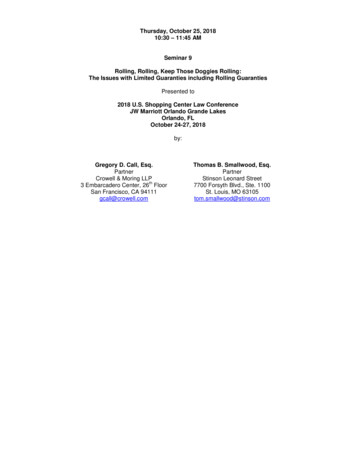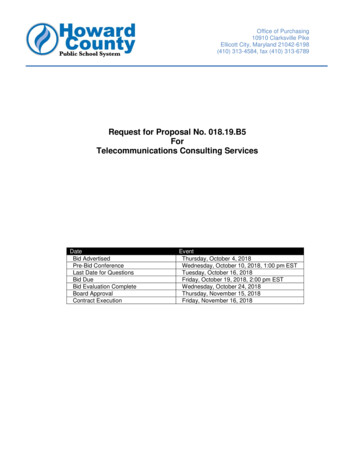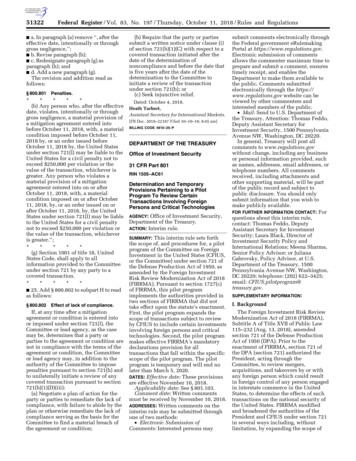
Transcription
Thursday, October 25, 201810:30 – 11:45 AMSeminar 9Rolling, Rolling, Keep Those Doggies Rolling:The Issues with Limited Guaranties including Rolling GuarantiesPresented to2018 U.S. Shopping Center Law ConferenceJW Marriott Orlando Grande LakesOrlando, FLOctober 24-27, 2018by:Gregory D. Call, Esq.PartnerCrowell & Moring LLPth3 Embarcadero Center, 26 FloorSan Francisco, CA 94111gcall@crowell.comThomas B. Smallwood, Esq.PartnerStinson Leonard Street7700 Forsyth Blvd., Ste. 1100St. Louis, MO 63105tom.smallwood@stinson.com
I.What is a Guaranty and why do Landlords prefer to have them?A.A Guaranty is a contract by which the Guarantor agrees to satisfy the underlying obligation of aprimary obligor to an obligee in the event that the primary obligor defaults on the underlyingiobligation. Typically, the Guarantor of a lease is the principal, shareholder, member, owner orother party playing a key role in the tenant entity or a parent or other affiliate of the tenant.B.Guaranties afford a landlord the opportunity to have multiple parties to pursue in the event of adeficiency and provide additional incentive to ensure tenant’s performance of the leaseobligations, both of which minimize the risk to landlord.C.II.1.It is not uncommon for tenants to hold their leasehold interests in a single purpose entityor other entity which does not have substantial assets.2.It is of particular importance in these instances that a landlord obtains additional securityto be certain that the lease obligations can be satisfied.3.While security deposits and letters of credit provide some protection for the landlord (andare often easier and cheaper to collect upon), tenants are often reluctant to tie-up largeamounts of capital or pay the cost and go through the hassle of maintaining a letter ofcredit sufficient to cover the lease obligations.Ideally, a landlord will want a Guaranty to cover all leasehold obligations throughout the entireterm of the lease. However, concessions may be made to reduce the exposure to the guarantorwhile still protecting the Landlord financially.1.For example, a landlord may agree to limit the Guaranty in duration or amount to alignwith the capital investment made by the landlord in connection with preparing the spacefor a tenant’s occupancy and to cover the downtime while reletting the space in the eventthat the lease goes sideways.2.A landlord may be far more likely to forego a Guaranty if they have incurred little or noinvestment in a space prior to leasing to a particular tenant.How is a Guaranty formed and what is the scope?A.B.The general rules for contract formation will apply to the creation of Guaranties (i.e. competentparties, subject matter, legal consideration, mutuality of agreement and mutuality of obligation).1.Interpretation of Guaranty provisions will vary across jurisdictions.2.Accordingly, it is important to make sure the language of your Guaranty clearly sets forththe obligations and agreements of the parties and to include any state-specificrequirements with respect to enforcement and collection pursuant to the Guaranty.The scope of a Guaranty will vary depending on the circumstances. The following sets forth asummary of some common types of Guaranties:1.Absolute Unconditional Guaranty: The broadest form of Guaranty whereby theGuarantor promises to pay or perform all obligations, upon primary obligor’s default,without contingencies.2.Limited Guaranties: A Guaranty may be limited with respect to payment or performanceobligations only, limited in duration or in dollar amount.a.Payment Guaranty: The Guarantor is only liable for rent payments due underthe lease and is not directly obligated to perform any acts that tenant is requiredto do pursuant to the lease.
III.IV.b.Fixed-Term Guaranty: A limited Guaranty that ends on a specified date,generally, provided that tenant does not default under the lease.c.Capped-Amount (Fixed or Formula-Based Amount) Guaranty: A limitedGuaranty that caps the Guarantor’s liability at a specified or formulaicallydetermined dollar amount. Formulae typically include unamortized brokers’ fees,tenant improvement allowance, and certain other costs incurred by the landlordat the beginning of the lease term, so the exposure is continually reducing overtime. Fixed caps may also step-down over time and transition to a RollingGuaranty.d.Good Guy Guaranty: A limited Guaranty that enables landlords to pursue theGuarantor to recover damages for tenant defaults until the time that tenantdelivers possession to landlord. Other forms may allow landlord to have recourseagainst the guarantor after certain triggering events that result in damage to thelandlord (much like a so-called “bad-boy” limited recourse loan guaranty), whichmay include failure to maintain required insurance, waste, tenant bankruptcy,fraud, and environmental contamination.e.Rolling Guaranty: A limited Guaranty in which the liability of Guarantor istypically limited to a number of years’ worth of rent starting upon tenant default,which may also reduce over time or be terminated after a period of time, providedthat tenant does not default under the lease or the tenant’s business hits certainfinancial benchmarks or meets other performance metrics.Rolling Guaranty Hot Button Issues/Drafting Considerations.A.Hybrid Rolling and Step-Down Cap Guaranties. As long as the tenant is performing all of itsobligations under the lease after the commencement date, the landlord’s risk generally declinesover time, thereby justifying a reduction in the lease guarantor’s liability. After a period of timewithout default, a Rolling Guaranty may expire, or the rolling cap may be reduced in incrementsover time or in one lump-sum step down. Additionally, a Rolling Guaranty payment cap may bereduced if the tenant has met certain sales, has reduced other liabilities or otherwise establisheda minimum net worth, or some other financial metric that correlates to a more solid tenant andlower landlord risk. Landlords and tenants often get creative on targets that warrant reduction inthe guarantor’s liability.B.Ambiguity in Guaranteed Rent. If the Guaranty simply provides that the guarantor of a ten-yearlease guarantees the payment of five years’ of fixed rent payable under the lease, an ambiguitymay have just been created. It should be specifically stated whether the guarantor is obligated topay the first five years’ of rent, after which time its obligations cease, or to pay five years’ worth ofrent on a rolling five-year basis, so the guaranty lives-on through the entire term.C.Enforcement Costs: Applicable to all limited Guaranties, a landlord should make sure that costsof enforcing the Guaranty are not capped by the limiting language. Without an express statement,the potentially high legal costs and court fees may not be recoverable by landlord in connectionwith an enforcement action, so landlords should be comprehensive in the definition of guaranteedobligations to include such costs, plus interest.D.What Kind of Guaranty is it really? In practice, it is commonplace to see language in theGuaranty that results in a merger of the various forms of limited Guaranties. For example,consider that a landlord has agreed to limit the exposure of the Guarantor to twelve months afterthe expiration of the third year of the lease term, however, if the tenant does not vacate thepremises (as required by the terms of a typical Good Guy Guaranty), then Landlord couldpotentially incur more costs than the Guarantor is liable, even though Landlord does not havepossession of the premises to enable Landlord to release the space. Accordingly, a Landlord maywant to require that tenant vacate the premises as a condition precedent to any limitation ofliability. Landlords and Guarantors must carefully negotiate the terms of the Guaranty to ensurethat the intentions of the parties are clearly captured.Rolling Guaranty Hot Button Issues/Cases.
A.B.C.V.Role of Judge vs. Jury.1.Judge will determine meaning of contract if unambiguous.2.If Judge determines contract term ambiguous, then jury may resolve meaning byconsideration of extrinsic evidence.3.Specific rules vary by state.Focus will be on Words of the Contract.1.Written terms of Guaranty will determine the scope. For example, Guaranty limited toinitial term if that is language of contract. 665-75 Eleventh Ave. Realty Corp. v.Schlanger, 265 A.D.2d 270 (1999).2.Circumstances that trigger Guaranty will depend on words of contract.Consideration of other evidence will depend on law of state.1.Some states have a strong parol evidence rule that does not allow consideration of parolevidence unless contract unclear on its face. New York is an example.2.Other states have a weak parol evidence rule that allows consideration of parol evidenceto consider whether evidence clear on its face is ambiguous. California is an example.3.Types of parol evidence considered includes:a.Drafting history.b.Course of performance.c.Course of dealing.d.Custom and practice.Case summaries:1.LoRicco v. Hula's New Haven, LLC, 53 Conn. Supp. 372, 117 A.3d 1007 (Super. Ct. 2013),aff'd, 157 Conn. App. 489, 115 A.3d 531 (2015)Facts: Landlord LoRicco and Hula's New Haven, LLC, lessee, entered into a 10-year lease, which wasguaranteed by three individuals for a rolling 12 month period. The guarantee provided that “[f]or a rollingtwelve (12) month period into the future . . . the undersigned hereby jointly and severally guarantee . . .the prompt payment of all rent, and the performance of all of the terms, covenants and conditions. . .”After missing some rental payments and being behind in payments for over a year, Hula returned thekeys to LoRicco with five years remaining on the lease. LoRicco sought the balance of Hula’s previouslyunpaid rent AND rent for the 12 months after it took possession of the leased premises.Issue: what event triggers the start of the time period of a rolling guarantee if it is not specified in thelease?Holding: Where the guaranty “does not expressly state what action will trigger, initiate, or start the runningof the twelve month period,” the rolling guarantee’s time period begins with the lessee’s first failure tomake payments due under the lease. The court observed that “Hula’s failure to make the payments dueunder the lease started, initiated or began the running of the twelve month period of the guarantors'liability because that was the date when lessor became aware that he may need to impose responsibilityon the guarantors.” The court further reasoned that the guarantee broadened the lessor's opportunity tocollect payments due under the lease while simultaneously limiting the guarantors’ liability to a twelvemonth period. Because the guarantee by its own terms limited the guarantors’ liability to a twelve month
span, the lessor’s proposed construction, which would have held them liable for over two years ofpayments, was untenable.2.Strip Delaware L.L.C. v. Landry's Restaurants, Inc., 5th Dist. Stark No. 2010CA00316, 2011Ohio-4075, 2011 WL 3587455 (August 15, 2011)Facts: Landry's Seafood House leased restaurant property from Strip Delaware LLC, guaranteed byLandry's Seafood Restaurants on a rolling two year term. The guarantee provided that “the liability ofGuarantor shall not exceed the rent payable under the Lease at the time of such default for two (2)consecutive years . . .” Landry initially defaulted on the lease in November 2006, but repossessed theleased premises a month later. After some litigation and Landry’s second default in April 2008, StripDelaware sued seeking recovery of lost rent and other damages for the period between the seconddefault and securing a new tenant in March 2009.Issue: Can a second breach restart the clock on a rolling guarantee’s time period?Holding: Under a rolling guaranty without an acceleration clause, “each new default by [the leasee]creates a new cause of action.” Even though some of Strip Delaware’s damages were incurred outsidetwo years from the first breach, they were well within two years from the second breach, so the guarantorwas liable.3.L & B 57th St., Inc. v. E.M. Blanchard, Inc., 143 F.3d 88 (1998)Facts: L&B and EMB entered into a lease. EMB’s father, Robert Blanchard, signed a standard good guyGuaranty. EMB paid a security deposit of 193,250. Well behind on rent, EMB vacated the premisesand "became judgment proof."Issue: Can a Landlord apply a security deposit exclusively to the non-guaranteed portion of the debt?Holding: Not without express contract provisions. In general, the security deposit is credited to theearliest arrears, i.e. the guaranteed portion of the debt.Issue: Is a good guy guarantor liable for re-letting expenses and attorney’s fees?Holding: Not without express contract provisions. Here, the good guy Guaranty provided that theguarantor’s “obligations herein shall only be applicable to the period prior to the Tenant’s surrender of thevacant premises.” Re-letting expenses and attorney’s fees are incurred after the premises aresurrendered.4.1407 Broadway Real Estate LLC v. Sicari, 2009 N.Y. Slip Op 30603(U)Facts: 1407 and Silk Denim entered into a lease. The lease contained two Guaranties, a personalGuaranty (holding the guarantor liable for all expenses up to a certain date) and a good guy Guaranty(holding guarantor liable until Silk Denim vacates the premises). Sicari signed both Guaranties, andincluded “Pres.” next to his signature. He had been told that there would be no personal liability.Issue: Can a lessee sign a Guaranty in his corporate capacity?Holding: In general, no. The presence of a corporate identity next to the signature is not controlling. AGuaranty is nearly worthless if a corporation guarantees its own lease. Here, Sicari is liable because theclause is titled “Personal ‘Good Guy’ Guaranty.”Issue: Can the guarantor claim lack of habitability to void the lease?Holding: It depends on the terms. Here, the Tenant contracted away the right to assert this defense inthe lease, therefore the guarantor can’t use this defense.Issue: Can a Landlord apply the security deposit exclusively to the non-guaranteed portion of the debt?
Holding: In general, no. Here, the Landlord can apply the security deposit to the non-guaranteed portionof the debt because the terms allow it.5.174 Second Equites Corp. v. Lax, 2012 NY Slip Op 31936(U) (Sup. Ct.)Facts: 174 and Citispaces entered into a lease, which was guaranteed by Lax and Horrowitz. TheGuaranty states that “Anything herein to the contrary notwithstanding this Guaranty shall not exceed toany obligations incurred by Tenant under the Lease which accrue five (5) years after commencementdate of the Lease term provided that. . .” followed by a typical good guy Guaranty clause. Citispacesdefaulted 16 months into the lease, and owed a balance of 94K.Issue: Are the guarantors liable for the entire lease’s rent or simply the past due rent?Holding: The guarantors are liable for the entire lease’s rent because they did not comply with theGuaranty’s terms (to wit they defaulted before 5 years).6.169 Bowery, LLC v. Bowery Dev. Grp., LLC, 2012 NY Slip Op 33282(U) (Sup. Ct.)Facts: 169 and Bowery entered into a lease which was guaranteed by Mr. McClure. After muchnegotiation, the good guy Guaranty stated: “In addition to the foregoing, in order for this provision to beeffective, Tenant must:” 1) tender at least 60 days advance notice of its intention to vacate; 2) have paidthe Landlord at least 1,044,000.00 under the lease; 3) not otherwise have been in default; 4) completedthe Tenant's work on the building; and 5) provide the Landlord with reasonable assurance that there areno claims or liabilities resulting from the acts or omissions of the Tenant. Bowery breached the leasewithout satisfying the Guaranty's conditions.Issue: Was McClure personally liable for unpaid rent after Bowery breached the lease?Holding: No. The conditions necessary to trigger the Guaranty were not met. The court dryly noted that“the personal Guaranty as ultimately finalized provides very little protection for plaintiff.”7.665-75 Eleventh Ave. Reality Corp. v. Schlanger, 265 A.D. 2d 270 (1999)Facts: 665-75 and Factice, Inc. entered into a lease which was guaranteed by Schlanger. The Guarantyprovided that it “shall remain and continue in full force and effect as to any renewal, change or extensionof the lease.” The parties entered into 25 written extensions of the lease. After the final lease expired onJune 30, 1995, Factice continued to rent as a month-to-month Tenant. Factice failed to pay rent fromOctober to June.Issue: Is the Guaranty still valid after the lease ends and the Tenant becomes a month-to-month Tenant?Holding: No. The guarantor should not be bound beyond the express terms of his Guaranty. TheGuaranty lapsed when the written lease did in June 30. This released the guarantor from liability.8.Lucky Jacks Entertainment Ctr., LLC v. Jopat Bldg. Corp, 32 So. 3d 565 (2009)Facts: Jopat and Lucky Jacks entered into a lease which was guaranteed by Lucky Jacks’ parentcompany, NGS. The sole purpose of the lease was to operate a video-sweepstakes gaming business.Two years into the lease, the state legislature made such businesses illegal, and Lucky Jacks breachedthe lease.Issue: If the sole purpose of the lease becomes illegal, does the lease become illegal and void, or simplyvoidable?Holding: The entire lease becomes void, including the Guaranty clause. Thus, NGS is not liable for thebreach.9.New Market Acquisitions, Ltd. v. Powerhouse Gym, 154 F. Supp. 2d 1213 (2001)
Facts: New Market and ESB (which operated a Powerhouse Gym franchise) entered into a lease whichwas guaranteed by Mr. Dabish. Mr. Dabish worked for Powerhouse Gym, and had granted ESB thefranchise license. In addition, he signed an unlimited Guaranty on behalf of himself, his wife, his brother,and his sister-in-law. ESB fell behind on its rent, and entered into a settlement agreement with NewMarket. New Market sued Mr. Dabish and his family to collect the remaining amount.Issue: Is a guarantor liable if the contracting parties settle?Holding: By default, no. However, the terms of the Guaranty can make the guarantor liable for damageseven though the contracting parties settle. Here, the Guaranty language was very unfavorable for theguarantor.Issue: Is the guarantor liable for damages and rent which accrue after termination?Holding: Again, the terms of the lease control, and held the guarantor liable for all damages, even afterthe lease is terminated.Issue: Can the guarantor seek indemnity from the contracting party for settling?Holding: Typically, they can. Here, however, they can't because the terms of the lease allow New Marketand ESB to settle without giving notice to the Guarantor.10.Lo-Ho LLC v. Batista, 62 A.D.3d 558 (2009)Facts: Lo-Ho and Batista entered into a lease which was guaranteed by Jose DeLeon. The Guarantyonly applied to “the attached lease.” After the first lease expired, Lo-Ho and Batista signed an “Expansionof Lease,” which required additional rent and real estate taxes. Before the term on the expansion of leaseended, Batista defaulted.Issue: If the terms of the lease are altered, is the guarantor liable?Holding: No. A Guaranty is to be interpreted in the strictest manner, and cannot be altered without theguarantor’s consent (absent explicit authorization in the contract). Since the expansion of lease includedadditional terms, the Guaranty didn't cover it.11.Zion Factory Stores Holding v. Lawrence, 2005 UT App. 361 (2005)Facts: Zion and Quilts entered into a lease which was guaranteed by Quilts’ two shareholders. TheGuaranty expired after the second lease year. The lease prohibited any change in voting rights unlessZion authorized them. One stockholder bought out the other, without notifying Zion (“the assignmentbreach”). After the two year Guaranty expired, Quilts abandoned the property.Issue: Does breaching any part of the contract invoke the Guaranty?Holding: No. Although the assignment breached the contract, there were no damages from this breach.Quilts abandoned the property after the Guaranty expired, therefore the remaining stockholder was notpersonally liable.Note: If the lease had contained an acceleration clause, then the entire rent would have been dueat the assignment breach, and the Guaranty clause would have held the stockholders liable. SeeSunset Center Properties, LLC v. Associated Medical Health Services, Inc., 1991 Fla. App. Lexis7919.VI.Rolling Guaranty Sample Limiting Language1.Okay: Guarantor unconditionally and absolutely guarantees to Landlord, and its successors andassigns, on a rolling one-year basis, the due, punctual and complete payment and performance byTenant, of all of the obligations, undertakings, covenants and agreements of Tenant under the Lease andunder any modification, amendment, variation or termination of the Lease. Guarantor’s obligations underthis Guaranty shall not exceed Tenant’s obligations under the Lease for one full Lease Year.
a. Note: This language is really a hybrid Capped-Amount and Rolling Guaranty in that it isalways limited to one-year’s exposure.b. Note: This language covers all of the lease obligations, but could better express the captureof costs, fees and interest incurred in connection with landlord’s enforcement efforts.2.Better: The Guarantor hereby, jointly and severally if more than one, unconditionally andirrevocably guarantees the prompt and faithful performance of all of the terms and provisions of the Leaseby the Tenant and any assignee of the Tenant, including, but not limited to, the payment of allinstallments of rent and other sums due to Landlord thereunder in full for the first five Lease Years of theTerm, and then, provided Tenant is not then in default under the Lease, continuing on a rolling one-yearbasis.a. Note: This language is more of a traditional rolling guaranty in that the rolling obligationperiod takes effect after a minimum number of years without default by tenant. As above, itcovers all of the lease obligations, but could better express the capture of costs, fees andinterest incurred in connection with landlord’s enforcement efforts.3.Best: Notwithstanding anything to the contrary contained herein, provided there is no existingDefault under the Lease at the end of the Lease Year, then at the commencement of theLease Year, Guarantor’s liability for Rent hereunder shall not exceed an amount equal to the sumof (i) all Rent due and payable, or which has accrued but as yet has not been billed, under the Leasethrough the date upon which Tenant has vacated or Landlord has obtained possession of the LeasedPremises, (ii) an amount equal to full calendar months of Rent due and payable or whichaccrues under the Lease from and after the date upon which Tenant has vacated or Landlord hasobtained possession of the Leased Premises, and (iii) Landlord’s costs of enforcing the terms of thisGuaranty, including but not limited to court costs and reasonable attorney fees.a. Note: If the letter of intent was not clear, introducing the condition to vacate is often objectedto if the intention is to establish a Rolling Guaranty, because the obligation to vacate isgenerally identified with the Good Guy Guaranty.
VII.Sample FormsGUARANTEE(Corporate Guarantor)FOR VALUE RECEIVED, and in consideration for, and as a material inducement to(the “Landlord”) to make the lease of even date herewith (the “Lease”) with(the “Tenant”), the undersigned, , acorporation (the “Guarantor”), unconditionally guarantees the full performance andobservance of all the covenants, conditions and agreements therein provided to be performed and observed bythe Tenant, the Tenant’s successors and assigns, and expressly agrees that the validity of this agreement and theobligations of the Guarantor shall in no wise be terminated, affected or impaired by reason of the granting by theLandlord of any indulgences to the Tenant or by reason of the assertion by the Landlord against the Tenant of anyof the rights or remedies reserved to the Landlord pursuant to the provisions of the Lease or by the relief of theTenant from any of the Tenant’s obligations under the Lease by operation of law or otherwise (including, butwithout limitation, the rejection of the Lease in connection with proceedings under the bankruptcy laws now orhereafter enacted); the Guarantor hereby waiving all suretyship defenses. The obligations of the Guarantorinclude the payment to Landlord of any monies payable by Tenant under any provisions of the Lease, at law, or inequity, including, without limitation, any monies payable by virtue of the breach of any warranty, the grant of anyindemnity or by virtue of any other covenant of Tenant under the Lease.The Guarantor further covenants and agrees that this Guaranty shall remain and continue in full force andeffect as to any renewal, modification or extension of the Lease, whether or not the Guarantor shall have receivedany notice of or consented to such renewal, modification or extension. The Guarantor further agrees that itsliability under this Guaranty shall be primary (and that the heading of this instrument and the use of the word“Guaranty(s)” shall not be interpreted to limit the aforesaid primary obligations of the Guarantor), and that in anyright of action which shall accrue to the Landlord under the Lease, the Landlord may, at its option, proceedagainst the Guarantor, any other guarantor, and the Tenant, jointly or severally, and may proceed against theGuarantor without having commenced any action against or having obtained any judgment against the Tenant orany other guarantor. The Guarantor irrevocably waives any and all rights the Guarantor may have at any time(whether arising directly or indirectly, by operation of law or by contract or otherwise) to assert any claim againstthe Tenant on account of payments made under this Guaranty, including, without limitation, any and all rights of orclaim for subrogation, contribution, reimbursement, exoneration and indemnity, and further waives any benefit ofand any right to participate in any security deposit or other collateral which may be held by the Landlord; and theGuarantor will not claim any set-off or counterclaim against the Tenant in respect of any liability the Guarantormay have to the Tenant. The Guarantor further represents to the Landlord as an inducement for it to make theLease, that the Guarantor owns all of the entire outstanding capital stock of the Tenant, that the execution anddelivery of this Guaranty is not in contravention of its charter or by-laws or applicable state laws, and has beenduly authorized by its Board of Directors.It is agreed that the failure of the Landlord to insist in any one or more instances upon a strictperformance or observance of any of the terms, provisions or covenants of the Lease or to exercise any righttherein contained shall not be construed or deemed to be a waiver or relinquishment for the future of such term,provision, covenant or right, but the same shall continue and remain in full force and effect. Receipt by theLandlord of rent with knowledge of the breach of any provision of the Lease shall not be deemed a waiver of suchbreach.No subletting, assignment or other transfer of the Lease, or any interest therein, shall operate toextinguish or diminish the liability of the Guarantor under this Guaranty; and wherever reference is made to theliability of the Tenant named in the Lease, such reference shall be deemed likewise to refer to the Guarantor.All payments becoming due under this Guaranty, including, without limitation, costs of collection, and notpaid when due shall bear interest from the applicable due date until received by the Landlord at the interest rateset forth in the Lease.It is further agreed that all of the terms and provisions hereof shall inure to the benefit of the heirs,executors, administrators and assigns of the Landlord, and shall be binding upon the successors and assigns ofthe Guarantor.
IN WITNESS WHEREOF, the Guarantor has caused this Guaranty to be executed in its corporate nameby its duly authorized representative, and its corporate seal to be affixed hereto this day of, 20 .GUARANTOR:INSERT NAMES HEREBy:Name:Title:Hereunto duly authorizedFORM OF GUARANTYTHIS GUARANTY (“Guaranty”) is made as of this day of , 20 , by,a,withofficesat(“Guarantor”) to and for the benefit of , a, with offices at (“Landlord”).RECITALSA. , a (“Tenant”) and Landlord are parties to that certainLease dated as of , 20 , as the same may be amended from time to time (collectively, the“Lease”) with respect to approximately rentable square feet of space on the ( ) floorof the building located at , Massachusetts (the “Premises”).B.Guarantor, either directly or indirectly, owns 100% of the ownership interests in Tenant, andGuarantor shall derive material financial benefits from the Lease.C.In order to induce Landlord to enter into the Lease with Tenant, Guarantor has agreed to executeand deliver this Guaranty to Landlord.NOW, THEREFORE, in consideration of the foregoing recitals, and for other good and valuableconsideration, the receipt and sufficiency of which are hereby acknowledged, Guarantor hereby agrees asfollows:1.Guaranty. Guarantor hereby guarantees the payment when due of Base Rent, and all otheradditional rent, interest and charges to be paid by Tenant under the Lease and the performance by Tenant of allof the terms, conditions, covenants and agreements of the Lease, and Guarantor promises to pay all of Landlord’sexpenses, including reasonable attorneys’ fees and disbursements, incurred by Landlord in enforcing theobligations of Tenant under the Lease and/or the obl
JW Marriott Orlando Grande Lakes Orlando, FL October 24-27, 2018 by: Gregory D. Call, Esq. Partner Crowell & Moring LLP 3 Embarcadero Center, 26th Floor San Francisco, CA 94111 gcall@crowell.com Thomas B. Smallwood , Esq. Partner Stinson Leonard Street 7700 Forsyth Blvd., Ste. 1100 St. Louis, MO 63105 tom.smallwood@stinson.com











